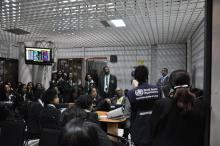Ethiopia Strengthens Preparedness for Ebola
Following the outbreak in Guinea, Sierra Leone, Liberia and Nigeria, Ebola virus disease (EVD) was declared as a Public Health Emergency of International Concern by the WHO Director General on 8 August 2014. As of 28 August 2014, a total of 3069 cases and 1552 deaths have reported by the World Health Organization (WHO). On 26 August 2014, the Democratic Republic of Congo (DRC) also notified WHO of an outbreak of Ebola virus disease. However, at this time, it is believed that the outbreak in DRC is unrelated to the ongoing outbreak in west Africa. The current epidemic in west Africa is the biggest and most complex that the world has experienced since the first human outbreak occurred in 1976. However, the survival rate has been higher than in previous outbreaks, 48%.
The Federal Ministry of Health (FMoH) has taken the necessary measures to prevent the spread of Ebola virus disease to Ethiopia. The Government high-level task force is chaired by the Deputy Prime Minister on behalf of the Prime Minister, and the high-level task force involving different partners is chaired by the Minister of Health. FMoH held an orientation workshop on 6 August on Ebola virus disease outbreak preparedness and response to health workers on surveillance (case detection and reporting), risk factors, clinical signs and symptoms and precautions to be taken for infection prevention. More than 200 health workers from government and private hospitals, NGOs, health centers, health bureaus and sub-cities in Addis Ababa and Ethiopian Airlines Clinic attended the orientation. Also present were representatives from the WHO, the US Center for Disease Control and Prevention (CDC) and Japan Embassy.
Speaking at the orientation workshop, Dr Pierre M’pele-Kilebou, WHO Representative to Ethiopia, said, “We need to make every effort to be well-prepared for this public health emergency. We don’t have to wait for Ebola.” The FMoH has developed a draft preparedness plan, designated an isolation unit at Amanuel hospital and pre-positioned Personal Protective Equipment (PPE) for use by its frontline staff in high risk situations. Over 350 airport, airline, immigration, police and security, and hotel staff have also been trained.
Although the risk of transmission of Ebola virus disease during air travel remains low, WHO Ethiopia has given briefings to Ethiopian Airlines crew members and airport personnel to raise awareness and understanding of the signs and symptoms, precautions and reporting of suspected Ebola cases. WHO also recommends countries to provide their citizens traveling to Ebola-affected countries with accurate and relevant information on the Ebola outbreak and measures to reduce the risk of exposure.
At the global level WHO is coordinating a massive scaling up of the international response. The African Union Commission and WHO are working closely together to address the health emergency in west Africa. On 13 August, the two organizations urged Member States to replenish the AU Emergency Fund and the African Public Health Emergency Fund managed by the WHO Regional Office for Africa to support affected countries. The African Union Commission also pledged to support the ongoing continental and global efforts to turn the tide against the Ebola Virus Disease outbreak with one million US dollars from its Humanitarian Fund. WHO Ethiopia has currently also deployed two of its staff members to Sierra Leone and Liberia to support the Ebola outbreak response.
Ebola virus disease (formerly known as Ebola haemorrhagic fever) is a severe, often fatal, illness that kills up to 90% of infected persons. It is one of the world’s most infectious diseases. The infection is transmitted by direct contact with the blood, body fluids and tissues of infected animals or people. Severely ill patients require intensive supportive care. During an outbreak, those at higher risk of infection are health workers, family members and others in close contact with sick people and deceased patients. In the current outbreak in West Africa, 50-70% of persons infected with the disease have died.
For more information, please contact Dr Admas Tefera, Preparedness, Surveillance and Response Programme Coordinator, WHO Ethiopia; email: admast [at] who.int





